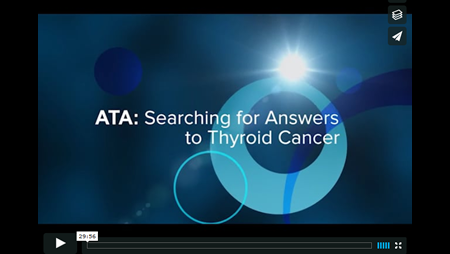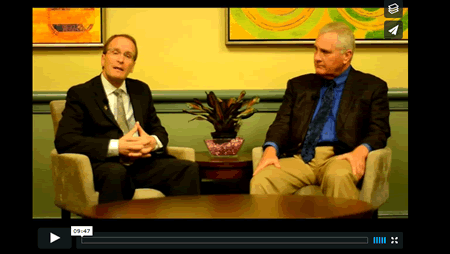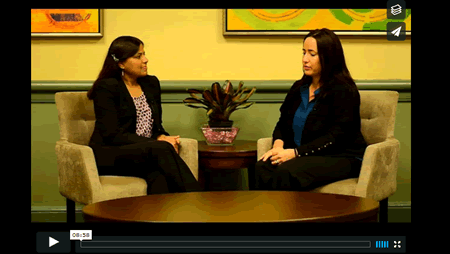Clinical Thyroidology for the Public summarizes selected research studies discussed in the previous month’s issue of Clinical Thyroidology, an official publication of the American Thyroid Association. Editor-in-chief, Alan Farwell, MD, FACE
Available in pdf format for saving and printing and Web page format for viewing online
PDF Format for Saving and Printing
Clinical Thyroidology for the Public Volume 13 Issue 9 (PDF file, 6.9 MB)
TABLE OF CONTENTS – Web Format
THYROID CANCER
Immune checkpoint inhibitor therapy using spartalizumab for anaplastic thyroid cancer
Anaplastic thyroid cancer is a rare, aggressive form of thyroid cancer which can be rapidly progressive and fatal and is resistant to most forms of therapy. Immune checkpoint inhibitor therapy is a type of cancer treatment that stimulates the body’s immune system to fight the cancer and has been effective in treating other aggressive cancers. The investigators of the study performed a clinical trial to examine the clinical response of anaplastic thyroid cancer patients treated with spartalizumab, an immune checkpoint inhibitor.
Capdevila J et al PD-1 Blockade in Anaplastic Thyroid Carcinoma. J Clin Oncol. 2020 38:2620-2627. doi: 10.1200/ JCO.19.02727.
(PDF File for saving and printing, 992 KB)
THYROID CANCER
If you had a small, low risk papillary thyroid cancer, would you choose to monitor closely or to have surgery?
There is new information that most of small papillary thyroid cancers may be grow so slowly that patients may live out their life without having any symptoms due to the thyroid cancer. Active surveillance may be a good alternative to surgery for these patients. This study asked 2 main questions: 1) if it is offered as an alternative, how often do patients choose active surveillance over surgery and 2) what are the reasons for their choices.
Sawka AM et al 2020 A prospective mixed-methods study of decision-making on surgery or active surveillance for low-risk papillary thyroid cancer. Thyroid. Epub 2020 Apr 8. PMID: 32126932.
(PDF File for saving and printing, 813 KB)
THYROID CANCER
Salivary gland damage associated with dose of radioactive iodine received in papillary thyroid cancer treatment
Patients with papillary thyroid cancer at higher risk of cancer recurrence are usually treated with radioactive iodine therapy following surgery. However, radioactive iodine therapy can cause salivary gland damage. While usually mild, it can be severe and is the most common adverse side effect of radioactive iodine therapy. The purpose of this study is to determine how often salivary gland damage occurs after radioactive iodine therapy.
Horvath E et al. 2020 Radioiodine-Induced Salivary Gland Damage Detected by Ultrasonography in Patients Treated for Papillary Thyroid Cancer: Radioactive Iodine Activity and Risk. Thyroid 2020 Jun 10. PMID: 32370663.
(PDF File for saving and printing, 727 KB)
THYROID CANCER
Serum thyroglobulin antibodies switching from negative to positive does not necessarily indicate structural thyroid cancer recurrence
Serum thyroglobulin autoantibodies (TgAbs) may be found in ~25% of patients with thyroid cancer following initial surgery. When TgAbs levels go down and become undetectable, it is a likely sign there is no more thyroid cancer present. Alternatively, when a patient has had a negative TgAb level that becomes positive, providers worry this may indicate thyroid cancer recurrence. This study was designed to look at how significant it is for a patient with a history of thyroid cancer to develop TgAbs when they were previously undetectable
Yin N et al 2020 The De novo detection of anti-thyroglobulin antibodies and differentiated thyroid cancer recurrence. Thyroid. Epub 2020 May 7. PMID: 32228151.
(PDF File for saving and printing, 726 KB)
THYROID NODULES
Radiofrequency and laser ablation of benign thyroid nodules are similarly effective at 6 months in a prospective, randomized trial
Occasionally benign nodules become large enough to either cause pressure symptoms in the neck or be otherwise bothersome to the patient. Surgery has been the only option. Recently, non-surgical methods such as radiofrequency ablation and laser ablation have been used. This study was done to directly compare these 2 treatments in their ability to decrease the size and symptoms of benign, solid thyroid nodules.
Cesareo R et al 2020 Laser ablation versus radiofrequency ablation for benign non-functioning thyroid nodules: Six-month results of a randomized, parallel, open-label, trial (LARA trial). Thyroid 2020 30: 847-856; PMID: 32056501.
(PDF File for saving and printing, 741 KB)
HYPERTHYROIDISM
Fixed-dose radioactive iodine therapy reduces goiter size and treats hyperthyroidism in most patients with toxic multinodular goiter
Toxic multinodular goiter is common cause of hyperthyroidism in the elderly and in areas of the world with low iodine in their diet. Radioactive iodine therapy is better tolerated in older people who have additional medical problems that result in an increased surgical risk. This study examines the effect of treating patients with toxic multinodular goiter with a fixed dose of radioactive iodine.
Roque C et al 2020 Long-term effects of radioiodine in toxic multinodular goitre: Thyroid volume, function and autoimmunity. J Clin Endocrinol Metab. Epub 2020 Apr 22. PMID: 32320467.
(PDF File for saving and printing, 727 KB)









